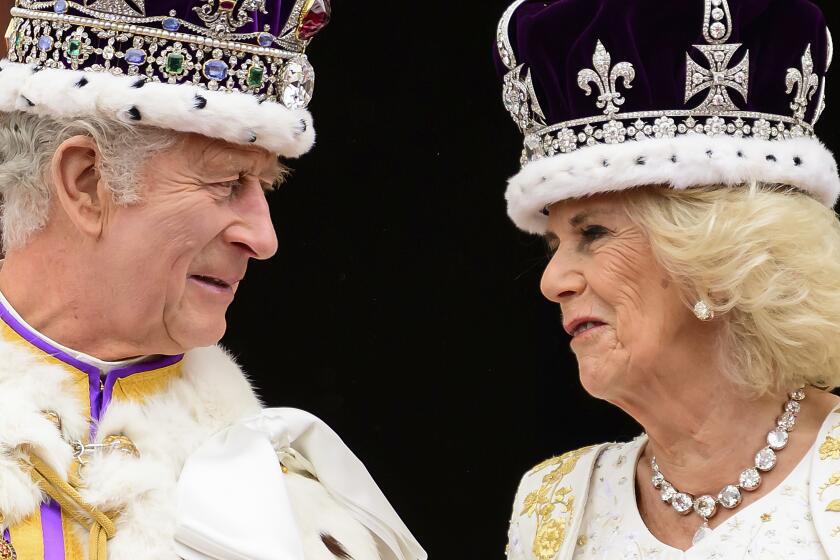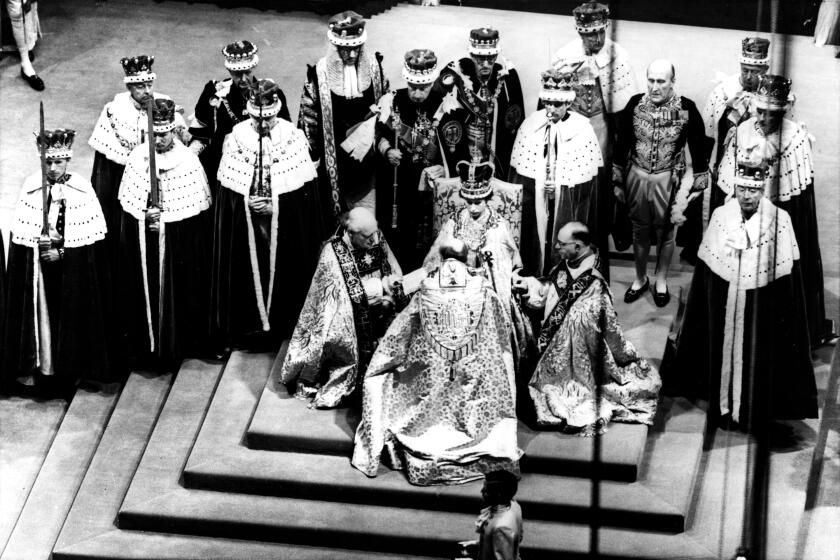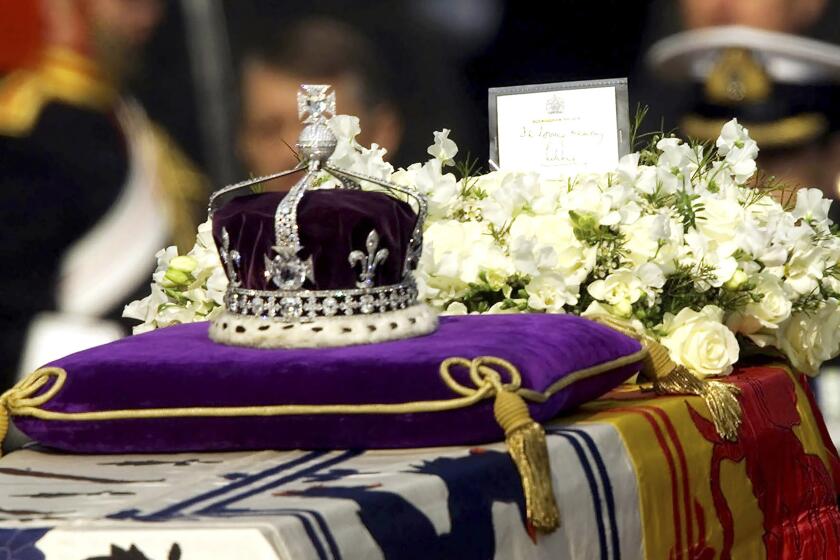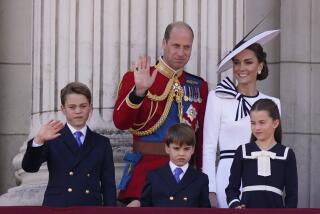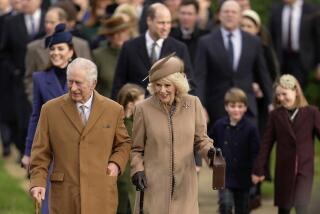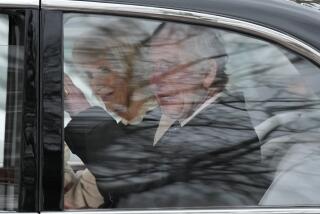Crowned king at long last, Britain’s Charles III formally ascends to the throne

‘God save the king!’ rings out in Westminster Abbey as Britain’s Charles III is crowned amid pomp and pageantry.
LONDON — King Charles III was crowned Saturday as Britain’s sovereign in a sumptuous, ritual-infused display of pageantry, taking the helm of a centuries-old monarchy that has often struggled, like his homeland, to find its place in the modern world.
Chants of “God save the king!” echoed off the ornate walls of Westminster Abbey before the five-pound weight of the jewel-encrusted St. Edward’s Crown, which is used only for coronations, was lowered onto his white-haired head in the culmination of Charles’ seven-decade-long journey to the throne.
Britain pulled out all the ceremonial stops for its first royal coronation since Charles’ late mother, Elizabeth II, formally assumed the throne in 1953. Before some 2,300 invited VIPs at Westminster Abbey — and an audience of millions worldwide — Charles and his wife, Camilla, enacted the arcane centuries-old rites of coronation, albeit punctuated by more changes of wardrobe than during a Taylor Swift concert.
Despite the traditional display of homage to the king as Charles symbolically received a variety of sacred objects — orb and scepter, ring and vestments — the ceremony’s carefully choreographed language was designed to evoke a note of humility.
“I come not to be served, but to serve,” he declared to the gathered assemblage.
The king’s formal accession is a reminder of Britain’s transition from a mighty empire, upon which the sun famously never set, to a small-to medium-sized power currently beset by economic woes.
The country’s diminishing world role was accentuated by Brexit, the split from the European Union approved by voters eight years ago, which so far has produced more headaches than a promised bounce in its trade reach and political clout.
The monarch remains the head of state in more than a dozen Commonwealth countries, several of which are contemplating a retooling of the relationship as often-bitter memories of Britain’s imperialistic past have in recent years come to dominate their shared narrative.
The coronation ceremony drew largely on the Protestant liturgy of the Church of England, whose teachings Charles swore to uphold. But in an effort to reflect Britain’s status as a multicultural society, Jewish, Muslim, Sikh and Buddhist faith leaders all took part in the investiture.
Following the two-hour ceremony, the royal couple left the way they arrived — in a vast ceremonial parade back to Buckingham Palace, although this time using a different horse-drawn royal carriage, the gilded but notoriously uncomfortable Gold State Coach. (Apparently, it lacks suspension.)
The crowning of King Charles III — code-named Operation Golden Orb — was a display of heritage, tradition and spectacle unmatched around the world.
Later, the newly crowned king and queen, together with ceremonial pages and family members who are “working royals” — an assemblage that pointedly did not include California resident Prince Harry — waved from the palace balcony to cheering crowds. Bad weather forced a scaling back of the traditional flyover, but helicopters followed by fighter jets trailing red, blue and white smoke thundered overhead.
Coronation day, kicking off a long holiday weekend of festivities, dawned damp and cloudy, then brightened, then succumbed again to rain. Along the route of the royal procession, thousands of bleary-eyed onlookers — tourists and homegrown royalists alike — had lined up days in advance to claim a prime viewing spot, camping out with tents, tarps and plastic chairs.
“They deserve my respect, and they have it,” said Dak Shi, a 66-year-old British health worker who waited hours to watch the royal procession pass.
Hours before the ceremony, in a moment of levity, or perhaps a keen appreciation of practical necessities, watchers near Trafalgar Square early Saturday enthusiastically cheered the passage of a truck carrying portable toilets. Onlookers wore hats, Burger King crowns or makeshift garments emblazoned with pretend royalty-themed regalia.
Security surrounding the event was the largest such operation in many years, said officials of the Metropolitan Police, which was fielding 11,000 officers to keep watch over the proceedings. Several arrests were reported at an anti-monarchy demonstration alongside the parade route, which drew hundreds of demonstrators, some hoisting placards that read “Not My King,” “Down with the Monarchy,” or, pointedly, photos of Charles’ first wife, the late Princess Diana.
You think royal intrigue over Harry, Meaghan and King Charles III’s coronation is bad? This monarch hired bouncers to block his queen from his ceremony.
Invited guests with coveted seats inside the majestic abbey included First Lady Jill Biden — resplendent in a periwinkle-blue suit and matching gloves — together with many other domestic and overseas dignitaries. Traditionally, the American president does not attend coronations.
Charles has actually been king since September, when his widely revered mother died at 96 after 70 years on the throne, which made her the longest-serving British monarch. The coronation is meant to affirm and formalize his role, while boosting national unity and providing the kind of royal spectacle and iconic imagery that draws visitors from all over the world.
“We’re just so excited — we came all the way from San Antonio!” said Debbie Hoover, 55, who traveled to London with her mother, Dottie. They booked their trip as soon as the coronation date was set.
Family drama, a constant refrain in royal circles, reached fever pitch as the final hours to the ceremony ticked down.
Harry — the king’s younger son, who had a highly publicized falling-out with the family after stepping back from royal duties — attended the ceremony alone. The former Meghan Markle, the American actress he married in 2018, was staying home in Montecito, Calif., with the couple’s children, marking the fourth birthday of their son, Archie.
Clad in a morning suit rather than the military uniform he used to wear to such august occasions, Harry played no formal role in the ceremonies. The British tabloids, with whom the prince is doing legal battle, gleefully declared that placement in the third row of pews in the medieval abbey left him in the same social Siberia as Prince Andrew, the king’s disgraced younger brother.
Andrew, 63, was stripped of royal duties after a financial settlement with a woman who said she was forced into sexual encounters with him.
Watching the coronation of King Charles III? Here’s what you should know about the crowns, scepters, orbs and more.
The moment also marked an extraordinary public rehabilitation on the part of the queen consort, now queen.
As Charles’ longtime paramour, Camilla was for many years a reviled figure after the breakdown of Charles’ marriage to Diana, Princess of Wales, who was killed in a car accident in Paris in 1997. Many Britons thought Camilla would never be queen, but she gradually gained public acceptance.
At 74, Charles waited nearly his whole life for this moment. At various points in his long interlude as heir apparent, some wondered whether the line of succession might even skip to his elder son, Prince William, whose wife, Kate, is generally considered the most popular royal. They have three young children, the eldest of whom, 9-year-old Prince George, is now second in line to the throne after his father.
The monarchy’s overall popularity has been sliding for years, but occasions like this still serve to demonstrate its enduring appeal. William, Charles and Kate thrilled onlookers Friday with a brief walkabout outside Buckingham Palace, where they reached over barricades to shake hands and greet the waiting crowds.
Others, though, greeted the display of pageantry with indifference. It was impossible to know how many Britons watching the coronation at home or in public places joined aloud in a vow of fealty to Charles, as the coronation program invited them to do.
Despite Charles’ decades in waiting to become king — or because of them — some analysts said it was difficult to consider his accession as marking a new era for the monarchy. His firstborn, William, is 40 — an age at which Charles still faced a third of a century as king-to-be.
In the end, Charles “may be a bit of a transition figure, with a lot of emphasis on William as a successor,” said Mark Wenman, a lecturer in political theory at the University of Birmingham.
Others suggested that even if the power of Diana’s ghostly presence is beginning to fade, the story of Charles and Camilla is hardly the stuff of fairy tales.
“Charles comes to the throne with quite a lot of baggage, and that is a disadvantage,” said royal historian and author Ed Owens.
Describing the new king and queen as “complex public figures,” he predicted they were “never going to be held in the same kind of reverence” as Elizabeth.
Special correspondent Christina Boyle contributed to this report.
More to Read
Sign up for Essential California
The most important California stories and recommendations in your inbox every morning.
You may occasionally receive promotional content from the Los Angeles Times.
